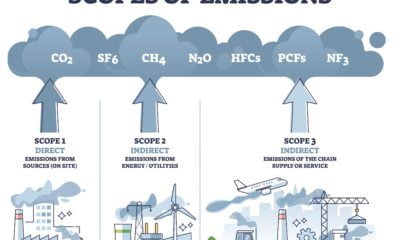

Energy
Government plans to end onshore wind subsidies early
The government is facing criticism after announcing that new onshore wind farm will be excluded from a subsidy scheme a year earlier than expected, from 1 April 2016.
The Department of Energy and Climate Change has argued that the “high volume” of onshore wind either deployed or in the pipeline means that the UK is “well on the way to meeting its climate change targets”.
Energy and Climate Change Secretary Amber Rudd commented, “We have a long-term plan to jeepthe lights on and our homes warm, power the economy with cleaner energy, and keep bills as low as possible for hard-working families.
“As part of our plan, we are committed to cutting our carbon emissions by fostering enterprise, competition, opportunity and growth.”
She added that the changes to subsidies would help clean technologies “stand on their own two feet” rather than rely on government support.
The plans have been widely criticised by the industry and environmental groups. Friends of the Earth argued that the government appears to making the environment pay the price for “rash pre-election promises”, noting that the Conservative government has plans to make fracking easier despite public objection.
Ben Warren, energy corporate finance leader at EY, commented, “The rationale behind today’s announcement is that the UK ha enough onshore wind capacity to help meet its targets. This ignores both the face that onshore wind can, and already does, provide cost effective power, as well as economic, social and environmental benefits that stem from it.”
The latest EY Renewable Energy Country Attractiveness Index put the UK in eighth place, its lowest level in 12 years. The index argued that contradictory energy objectives and the EU referendum may put clean energy investors off supporting UK projects.
Warren added, “It is time for the government to clarify its strategy for the UK’s future energy mix. If the objective is to secure clean and affordable energy then the government’s policy needs to accelerate the deployment of onshore wind and solar PV, the two technologies that have proved that can be the cheapest and most rapidly deployable sources of clean energy.”
Photo: Henry Burrows via Flickr
Further reading:
EY: EU referendum and energy policy puts UK in 8th place for renewable investment
2014 record year for UK’s renewable energy investment
Policy uncertainty leads to UK slipping down renewable investment rankings
Foreign investment in UK renewable energy projects on the rise
Renewable energy accounted for 15% of UK electricity in 2013


 Environment12 months ago
Environment12 months agoAre Polymer Banknotes: an Eco-Friendly Trend or a Groundswell?

 Features11 months ago
Features11 months agoEco-Friendly Cryptocurrencies: Sustainable Investment Choices

 Features12 months ago
Features12 months agoEco-Friendly Crypto Traders Must Find the Right Exchange

 Energy11 months ago
Energy11 months agoThe Growing Role of Solar Panels in Ireland’s Energy Future






























